Presumptions in Evidence Law: FRE 301 and 302
- Author
- Pre-Law Productions
- Published
- Mon 15 Sep 2025
- Episode Link
- None
🎙️ Podcast Summary – Presumptions in Evidence
In this episode of American Law Café, we unpack how the Federal Rules of Evidence deal with presumptions, focusing on the Federal Rules of Evidence (FRE) 301 and 302.
- FRE 301 – Presumptions in Civil Cases
Presumptions shift the burden of producing evidence, but not the burden of persuasion. For example, if the law presumes a mailed letter was received, the other party must show it wasn’t—but the ultimate burden of persuasion stays with the original side. Think of it like a bursting bubble: once rebutted, the presumption disappears. - FRE 302 – State Law Presumptions
When a federal court applies state law to decide a civil case, it must also apply that state’s presumptions. This keeps outcomes consistent between state and federal courts, especially in diversity cases. - Civil vs. Criminal Distinction
Civil cases use many presumptions—like ownership, legitimacy of a child, or receipt of mail. Criminal cases, by contrast, are tightly limited because of due process. The presumption of innocence is the only true presumption. Other so-called presumptions are really just permissive inferences, giving jurors discretion rather than requiring conviction. - Case Applications
• Seavers v. Methodist Medical Center – Expanded res ipsa loquitur in medical malpractice, allowing expert testimony to help establish negligence.
• State v. Sensing – Clarified that DUI breath test results create a permissive inference, not a mandatory presumption.
• State v. Brown – Highlighted how Rules 103–106 work to preserve fairness, context, and appellate review in evidentiary disputes
Introductory Music for American Law Cafe. In Jazz Short by moodmode / Vlad Krotov.
🎶 Intro Music: "In Jazz Short" by moodmode / Vlad Krotov
📚 Content Created by Heather Mora
🎙️ Hosted on Buzzsprout: https://www.buzzsprout.com/2429305
